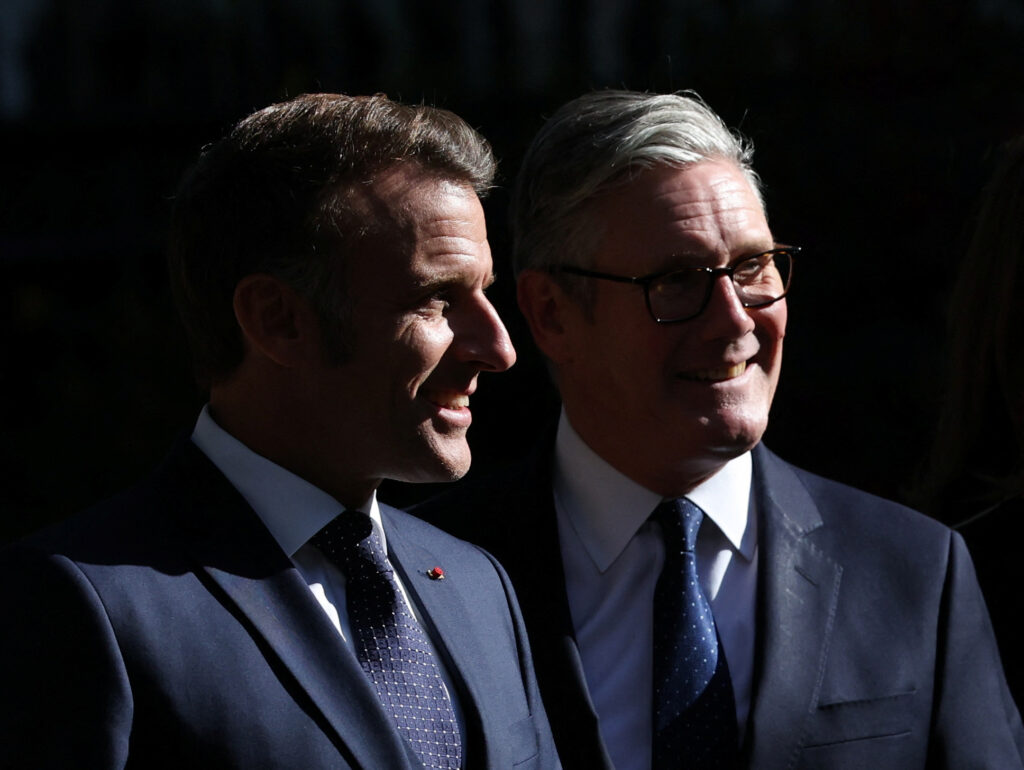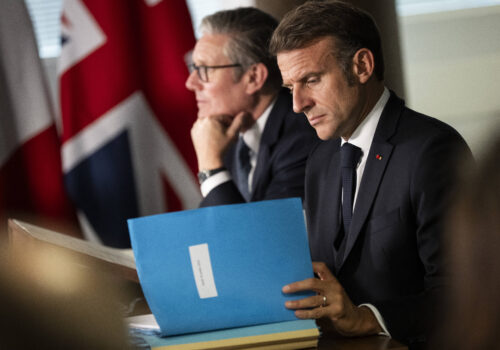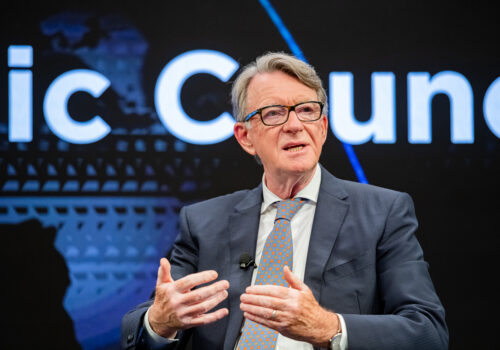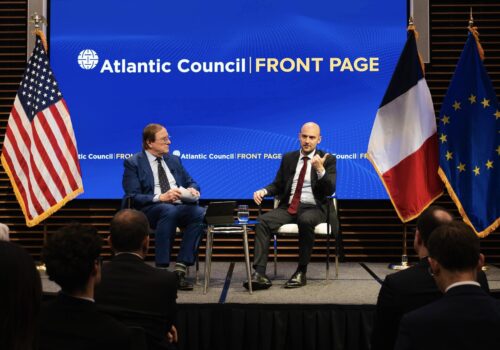In September 2022, Liz Truss, at that moment running to become UK Conservative Party leader and prime minister, was asked whether French President Emmanuel Macron was a friend or foe to the United Kingdom. “The jury’s out,” Truss said.
Since the 2016 Brexit referendum, UK-France relations had been in the doldrums. One of the most stubborn sticking points in the yearslong Brexit negotiations was a dispute between London and Paris over fishing rights. And in 2021, the defense partnership between Australia, the United Kingdom, and the United States, known as AUKUS, overturned a deal signed between France and Australia on industrial cooperation on submarines. What’s more, British politicians had long accused France of not doing enough to address the scourge of people smugglers sending desperate migrants in flimsy dinghies across the Channel to the English shore.
But less than three years after Truss’s comment about Macron, the mood in London has changed substantially. The Labour Party, elected back to power in 2024 after fourteen years in opposition and led by Prime Minister Keir Starmer, set out to reset the United Kingdom’s relationship with the European Union and the continent as a whole.
Last week, Macron concluded a three-day state visit to the United Kingdom, the first by any European leader since Brexit. For two countries with such a long, complicated, and intertwined bilateral history, symbolism and ceremony matter. And last week, Britain put its best ceremonial foot forward to show that Macron is not a foe, but the best of amis. There were toasts at white-tie banquets and speeches to Parliament. But the real test of this new UK-France bonhomie will be if the progress made during Macron’s visit moves forward now that the trip is over.
What was announced
On defense, there were significant new agreements on two fronts. First, Starmer and Macron agreed to new deals to ramp up defense industrial production, which, in the tradition of UK-French naming conventions, is being dubbed the “Entente Industrielle.” This new entente includes additional orders of the UK-French Storm Shadow—which Ukraine uses in its defense against Russia—while the two sides progress on a joint project for next-generation deep strike and anti-ship missiles as a part of the ultimate replacement system for Storm Shadow. Also agreed during Macron’s visit were new plans to strengthen collaboration on cutting-edge technologies in support of collective defense, including supercomputers, artificial intelligence, and satellite connectivity.
Next, London and Paris adopted a new and significant agreement to “coordinate” the two countries’ respective nuclear deterrents. Importantly, this does not mean that they will relinquish sovereignty of their nuclear decision-making. But the agreement will allow both sides to find new avenues for cooperation and coordination to maximize their nuclear forces’ strategic effects. The United States, which has long called for greater European burden-sharing on defense, should welcome the steps the United Kingdom and France are taking to strengthen European and NATO defense and deterrence capabilities.
But the agreements went beyond bilateral defense measures. In March of this year, Macron and Starmer stepped up on leading Western support for Ukraine, creating a “Coalition of the Willing.” Led by the United Kingdom and France, this group is intended to support and enforce an eventual peace deal between Moscow and Kyiv. During Macron’s visit, the two leaders convened a meeting of the Coalition of the Willing, announcing that its new permanent headquarters would be established in Paris and London with a coordination cell in Kyiv. For the first time, the United States was represented at such a meeting, with Keith Kellogg, the US special envoy for Ukraine, joined by Senators Lindsey Graham (R-SC) and Richard Blumenthal (D-CT).
But perhaps the most sought-after prize that Starmer achieved during Macron’s stay in London was an agreement with France on migration. Britain and France committed to piloting a “one in, one out” scheme to return asylum seekers arriving in boats in the United Kingdom to France in exchange for accepting France-based migrants with family connections to Britain. And in keeping with the historical symbolism that defines Anglo-French relations, Macron agreed to loan the Bayeux tapestry—a medieval embroidered depiction of the Norman conquest of England in 1066—to the British Museum, the tapestry’s first return to English shores in nine hundred years.
What comes next
While Starmer has faced domestic political difficulties, the scorecard for his first year as a global statesman has been positive. He has astutely navigated a potentially difficult relationship with the Trump administration, reset the United Kingdom’s relationship with Europe, reinvested in defense, and demonstrated leadership by rallying support for Ukraine. In the post-Brexit years, the United Kingdom was seen by Europeans as a dysfunctional laughingstock. Not anymore.
This matters, especially at a time when Europe is looking for leadership to navigate a geopolitically uncertain period. Europe works better when its two nuclear-armed permanent members of the United Nations Security Council are in sync and working together effectively. And NATO is strengthened when two of its leading militaries interact with a constructive mix of collaboration and competition.
But the lofty goals for Anglo-French cooperation coming out of Macron’s UK visit are far from assured. Europe is only beginning what will be a generation-long journey to rearm. The defense investments announced last week will need to balloon in the coming years or their symbolism will ring hollow. The Coalition of the Willing for Ukraine could fizzle into irrelevance if Starmer and Macron can’t enlist a critical mass of allies to make commitments and provide capabilities. And, as the last decade has shown, domestic politics in either country can blow well-intentioned plans off course. Both leaders are wary of threats from domestic challengers on the right. The migration deal in particular reflects this political reality. Many doubt that it will be effective, and it could also prompt second-order complications with southern European governments.
So, will the Entente Industrielle endure as a landmark agreement between France and the United Kingdom, as Macron, Starmer, and many in the transatlantic community hope it will? Until the hard work begins, the jury is out.
Philippe Dickinson is a deputy director with the Transatlantic Security Initiative at the Atlantic Council’s Scowcroft Center for Strategy and Security. Prior to joining the Council, he was a career diplomat with the United Kingdom’s Foreign, Commonwealth and Development Office.
Further reading
Wed, Jul 16, 2025
Reading between the lines of the new France-UK nuclear entente
New Atlanticist By Léonie Allard
French President Emmanuel Macron and British Prime Minister Kier Starmer released a “truly historic” declaration on nuclear planning on July 10.
Tue, May 27, 2025
British ambassador to the US: The UK must ‘become less dependent on America, while remaining inseparably linked’
New Atlanticist By
In speaking at the Atlantic Council's 2025 Christopher J. Makins Lecture, Peter Mandelson outlined how the United Kingdom and the rest of Europe can foster peace through military, economic, and technological strength.
Fri, May 2, 2025
France’s foreign minister on Europe’s role in the ‘new era of multilateralism’
New Atlanticist By Daniel Hojnacki
Jean-Noël Barrot laid out his vision of European strategic autonomy and cautioned Washington against pulling back from the multilateral system it helped build.
Image: France's President Emmanuel Macron meets with Britain's Prime Minister Keir Starmer, during his state visit to the UK, in London, Britain, July 8, 2025. REUTERS/Suzanne Plunkett/Pool




